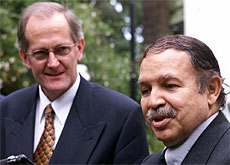
Algerian president on first state visit to Bern

The Algerian president, Abdelaziz Bouteflika, is in Bern for the first state visit to Switzerland since Algerian independence.
One of his first tasks was to sign a bilateral treaty on economic ties at a ceremony on Tuesday.
The accord signed together with Swiss President Joseph Deiss is a framework agreement for investment support.
Switzerland played a key role in the Evian talks that ended the eight-year Algerian civil war in 1962, and the two countries have maintained close links ever since.
“The visit testifies to the solid relationship of trust and friendship dating back to the time of the war,” said Kamal Huhu, Algeria’s ambassador to Switzerland.
“It allows us to express our gratitude to the government and people of Switzerland for the role they played during those years.”
Economics first
Political history notwithstanding, both parties are now focusing on developing economic relations.
Since the mid-1990s, the Algerian authorities have embarked on a policy of structural reform and market liberalisation, which is opening up new opportunities for investors.
However, the Algerian ambassador in Bern acknowledges that what has been missing until now is a legal framework to protect investments.
He says the new accord means Swiss companies will in future “be able to have greater confidence in our country”.
Florian Roduit of the Swiss Business Federation, economiesuisse, agrees that it will “fulfil one of the basic demands of investors and help to relaunch negotiations aimed at Algeria’s entry into the World Trade Organization”.
Until now, Switzerland has ranked Algeria in fourth place on a scale of one to seven in terms of risks for investors.
Legal framework
The Swiss government says its role is to prepare a legal framework, but it will be up to the private sector to open up the Algerian market and its development potential.
For its part, the Algerian government is focusing on developing cooperation in terms of scientific research and professional training.
An agreement, now in the final stages of preparation, is due to be signed in early 2005. The main sectors affected will be high-tech and precision engineering.
Switzerland is also very interested in energy sector liberalisation, as Algeria is its third-largest supplier after Libya and Nigeria.
Swiss firms such as ABB have won orders to overhaul the gas extraction facilities of the state-owned corporation, Sonatrac, and the local electricity grid.
Oil prices
In 2003, Swiss imports from Algeria were worth SFr140 million ($122 million), while Swiss exports came to SFr128 million.
The Swiss primarily buy Algerian hydrocarbons and other energy products (92 per cent of the total), while Algerians largely go for Swiss machinery, pharmaceuticals and chemicals.
In addition to recent progress on the political and security fronts, the ambassador pointed out that Algeria had immense financial resources, thanks to rising oil prices.
He said the Algerian government plannned to invest about $50 billion to stimulate the economy and added that Switzerland could “play a part” in this process.
On the human-rights front, Jürg Keller, spokesman for the Swiss section of Amnesty International, said he was satisfied with the exchange of information with Algeria.
But he warned: “There are still frequent violations of human rights: torture is widespread, and the Algerian government has not provided information on the fate of thousands of people who have disappeared.”
swissinfo, Mohammed Chérif (adapted from Arabic)
Switzerland played a key role in the Evian talks that ended the eight-year Algerian civil war in 1962.
The two countries are now focusing on developing economic relations.
The Swiss section of Amnesty International says human rights abuses and torture are still widespread in Algeria.
Algeria is Switzerland’s third-largest supplier of energy after Libya and Nigeria.
Last year Swiss imports from Algeria were worth SFr140 million ($122 million), while Swiss exports came to SFr128 million.
Algeria largely buys Swiss machinery, pharmaceuticals and chemicals.

In compliance with the JTI standards
More: SWI swissinfo.ch certified by the Journalism Trust Initiative

























You can find an overview of ongoing debates with our journalists here . Please join us!
If you want to start a conversation about a topic raised in this article or want to report factual errors, email us at english@swissinfo.ch.